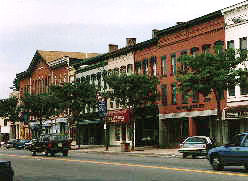


From the 1860 Gazetteer of the State of New York, by J. H. French
PALMYRA - was formed in Jan. 1789. Macedon was taken off in 1823. It lies on the S. border of the co., W. of the center. Its surface is undulating. Mud Creek flows E. through the town, S. of the center. Its tributaries are East and West Red Creeks and several small streams. The soil is a calcareous loam, with marl on the creek bottoms, and drift, sand, and gravel on the hills. Palmyra, (p.v.) in the S. W. part, was incorp. April 9, 1819. It is an important canal village, and is a station on the N. Y. C. R. R. It contains 5 churches, the Palmyra Union School, (1) a bank, 2 printing offices, and a number of manufactories. (2) East Palmyra, (p.v.) a canal and R. R. station, in the E. part, contains 2 churches, a gristmill, and 20 houses. The first settlement was made by John Swift, in 1789 or '90. (3) In the winter of 1788-89, John Swift and Col. John Jenkins purchased Tp. 12, R. 2, now Palmyra, and commenced the survey of it in March. During the summer, John Swift moved into the town, and erected a log house and storehouse a little N. of the lower end of Main St., Palmyra. Before the close of the year 1789, Webb Harwood and family, Noah Porter, Jonathan Warner, and Bennett Bates, from Mass., came in. Mr. Harwood settled a little W. of the village. David White and family came in in 1790. The first church (Presb.) was formed in 1797; Rev. Eleazur Fairbanks was the first pastor. (4) Joseph Smith, the father of the prophet, settled a little S. of Palmyra Village in 1819. The plates of the Mormon Bible were said to have been dug up on a hillside in Manchester, Ontario co., a little S. of the Palmyra line. The Smiths were money diggers, and had previously been digging in this locality for gold. The book was printed at the office of the Wayne Sentinel, Martin Harris, a convert, mortgaging his farm to defray the expense.
Footnotes:
From the 1824 Gazetteer of the State of New York, by Horatio Gates Spafford
PALMYRA, a Post-Township of Ontario County, 15 miles N. of Canandaigua, and 220 from Albany; bounded N. by Ontario and Williamson, E. by Lyons, S. by Manchester and Farmington, W. by Perrinton of Monroe County. It comprises 2 townships of Phelps and Gorham's Purchase, being No. 12, in the 2d and 3d ranges. This town has Mud Creek running eastward through its whole length, a little S. of the centre. This creek affords find advantages for mills, and is of some little use for navigation. The soil is of a superior quality, and the settlements of a date to give much farming ease and independence to the inhabitants. There is a large meeting of Quakers, and there is one Episcopal, and 1 Presbyterian Church, with 25 common school-houses and schools. A road, from Canandaigua to Sodus bay, leads across the E. part, and there are many other roads, in various directions. This Town is 12 miles long, E. and W., and 6 miles wide. Besides Mud Creek, the W. township has Red creek, from Perrinton, and the Erie Canal extends through the whole length, E. and W., passing through the Village of Palmyra. As it is a good Town, and enjoys the navigation of this Canal, its population will probably increase pretty rapidly, and it may soon be divided, into two towns. At no distant day, it is not improbable that a new County may be erected, from the N. end of Ontario, when the steeples of its Capital may rise somewhere along here, on the banks of the Canal. Public convenience may call for this, by and by, but the thirst for office, and the intrigues and designs of self-interest, and party-policy, will hardly wait so long. The roads are numerous and good, and the Canal navigation is here in full activity, Aug. 1822. Population, 3724; 748 persons engaged in agriculture, 190 in manufactures, and 18 in commerce; 9 foreigners not naturalized; 46 free blacks; no slaves; taxable property, $486001; Electors, 841; 16292 acres of improved land; 3402 cattle, 793 horses, 7734 sheep; 43830 yards of cloth made in 1821; 10 grist mills, 17 saw mills, 2 fulling mills, 2 carding machines, 1 iron works, 6 distilleries, and 2 asheries; school districts, 25; schools kept 5 months; $498.53 public monies; 1048 children; 1253 taught in the schools in 1821. The Village, or Borough of Palmyra, where is the Post Office, is on Mud creek, in the E. township, and has the Erie Canal along the N., and across the E. part of the village. It has long been a place of very considerable business, and is the third in rank in this County, and increasing rapidly. Several large stores and store houses, for the Canal trade, are erected and erecting here, and a regular line of two Canal Packets, for passengers, have been running through the season of 1822, between Pittsford of Monroe Co., this place and Utica. This Village is incorporated and ought to be called a Borough, for reasons assigned under Ithaca, and many other places. It has 1 Presbyterian, 1 Methodist, and 1 Baptist Church, an academy, 2 or 3 school-houses, 13 dry good stores, 3 druggist shops, 3 inns, 2 tanneries, one of which is so extensive as to employ 40 hands, and a number of other mechanical establishments. It has 3 capacious basins, on the Canal, one of which has a dry dock. Mud creek runs eastward, 40 rods N. of the main street, which is one mile in length, and the Erie Canal is between this street and the creek, except that near the E. border of the Village, it crosses this street. At the W. extremity of the Village, the Canal comes within 2 rods of it, so that Palmyra may by-and-by look much more like a city of the Netherlands, than its great namesake, of ancient fame. There are many mills, close bordering, and some within the Village, which now contains 125 families, 85 dwelling houses, a printing office, post office, and about 1000 inhabitants. A turnpike is nearly finished to Montezuma. Palmyra Village is situated 13 miles N. of Canandaigua, 22 E. of Rochester, 15 W. of Lyons, 16 S. of Pulteneyville, 12 NW of Vienna V. and 22 from Geneva.
Current Place Names in the Town of Palmyra:
Cooney Crossing, East Palmyra, Palmyra
1901 Directory of Palmyra Residents
Property Owners of the Town of Palmyra, 1891: added 2/15/14
1914 Farm Directory of Palmyra
1800 Ontario County Census - Palmyra
1810 Ontario County Census - Palmyra
Early History & Settlement of Palmyra, 1858: added 4/3/12
Centennial Celebration, 1876, with Historical Sketch of Early History of Palmyra
1874-75 Palmyra Marriage and Death Records
Marriages at E. Palmyra Methodist Church 1875-1907
Some 19th Century Local Quaker Marriages
Western Presbyterian Church Palmyra History
Ministers & Rectors of Zion Episcopal Church of Palmyra
History of East Palmyra M.E. Church
1889 Offficers of Palmyra Presbyterian Church
From Palmyra, NY to Palmyra, MI - Our Migrating Ancestors
Unclaimed Mail, Palmyra Post Office, Jan. 1, 1841
1913 Palmyra Classical High School News Booklet
Palmyra Courier Newspapers from the 1880s & 1890s
Photos of Garlock Employees in 1937
WWI Veterans Who Worked For Garlock Packing
James Duane Galloway Letter, Palmyra 1912
The Hathaway Family of Palmyra
Other Palmyra articles, including cemetery lists, are found throughout the site, and can be found through our site search engine. We just don't have free time to index them for this page.
SOME VERY GOOD LINKS!
Quaker Records from Farmington Monthly Meeting, Ontario County, New York: this is a link to another website. These records contain many local 19th century baptisms and marriages, particularly of residents of Palmyra. This is an out-of-copyright older resource, which you can view directly on the site, or download for free in various formats. Unlike most other sites offering "free" book downloads, archive.org doesn't require that you compromise your privacy by having to "register" or "create an account."
The small book Palmyra, Wayne County, New York, was compiled by the Woman's Society of the Western Presbyterian Church, published at Rochester, N.Y. by The Herald Press in 1907. You can view on line a facsimile of a Library of Congress copy of the book here OR download a .pdf of it.
Alternate Link to Same Book
Museums of Historic Palmyra - link to another website that will open in a new window.

Back to Wayne County Townships Page